As the world prepares for the COP26 summit beginning October 31, 2021, to address climate change, more congregations may be hearing their pastors preach about the climate crisis than in recent years. My team and I have conducted national surveys of mainline Protestant clergy and found that there has been a shift in their willingness to address environmental issues compared to previous years.
In a longitudinal study surveying thousands of U.S. mainline Protestant clergy over the past four years, we found that clergy reported preaching more sermons about environmental issues in 2020 than in 2016.
By comparing survey waves in 2017 (n=1,104) and 2021 (n=1,919), we found a 19-point increase in the number of mainline Protestant clergy who reported preaching about climate change and related issues. In the 2017 survey, only 30% of clergy said they had addressed environmental issues in the previous year, but that number jumped to 49% in 2021. In other words, nearly half of mainline Protestant clergy indicated they had addressed environmental issues in 2020, ranking #6 in the top ten.
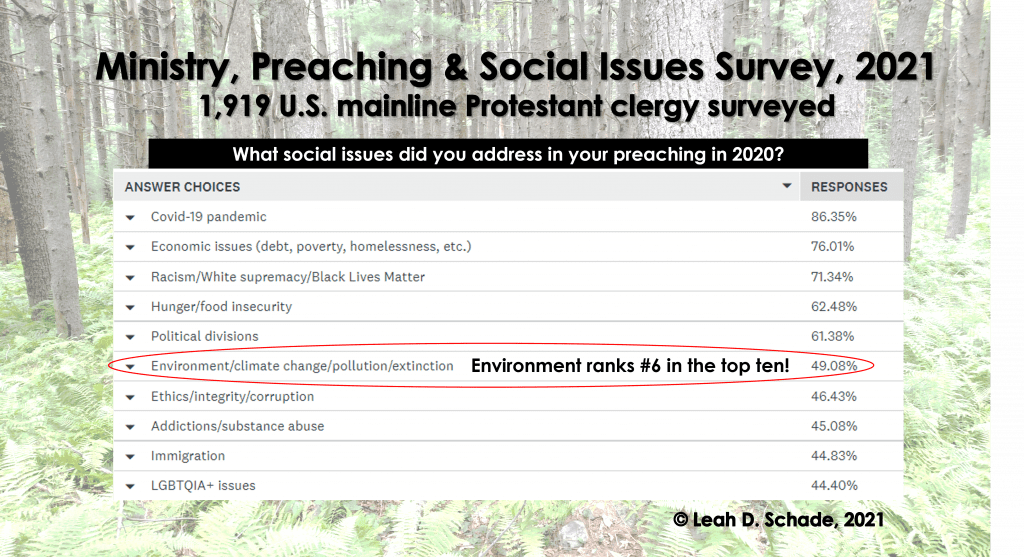
Of course, whether or not clergy actually preach sermons about climate change, and the degree to which they do so, is beyond the scope of our study. However, with the IPCC report released in August this year issuing a “code red for humanity,” along with the COP26 summit beginning next week, the urgency for clergy to address the climate crisis may be stronger than ever.
Preaching about climate change has been a “third rail.”
For decades, environmental issues have been a political “third rail” for clergy who resisted preaching about topics such as climate change for fear of backlash from their congregations. For instance, in 2014, the Public Religion Research Institute (PRRI) published a study indicating that only a third of Americans said their clergy leader spoke about climate change often (11%) or (sometimes 25%). At that time, more than 6-in-10 Americans said their clergy leader rarely (29%) or never (33%) referenced climate change.
Three years later, I conducted my own study in which I surveyed mainline Protestant clergy serving congregations in the U.S. and found that things had not changed.
In 2017, respondents were given a list of social issues. They marked which ones they had addressed in their sermons in the previous year and which ones they intentionally avoided. As with the PRRI study, I found that only a third of them indicated they had preached on environmental issues such as climate change, pollution, environmental racism, and species extinction in the previous year.
But this year when my team and I analyzed results from the second wave of our survey, we noticed a shift.
In the 2021, the number of clergy who reported preaching about environmental issues the previous year increased to 49%. In other words, nearly half of the respondents indicated they had addressed environmental issues in their sermons in 2020.
Not surprisingly, progressive clergy serving progressive congregations saw the largest jump in addressing environmental issues, from 50% in 2016 to 65% in 2020.
But here’s the really interesting find.
Even conservative clergy serving conservative congregations saw a small increase, from 13% in 2016 to 19% in 2020.
Why the shift?
Undoubtedly, the acceleration and intensity of the signs of the climate crisis (such as severe weather events, wildfires, sea level rise, etc.) have been a factor in the increasing number of clergy willing to address this issue in the pulpit. But there seems to have been a shift in public opinion about climate change as well.
EcoAmerica, for instance, reports that 78% of Americans are concerned about climate change in 2021, which is a 10% increase from 2015’s number of 68%. Further, their research indicates that 77% of Americans surveyed in 2021 would support actions to address climate change that will protect human health.
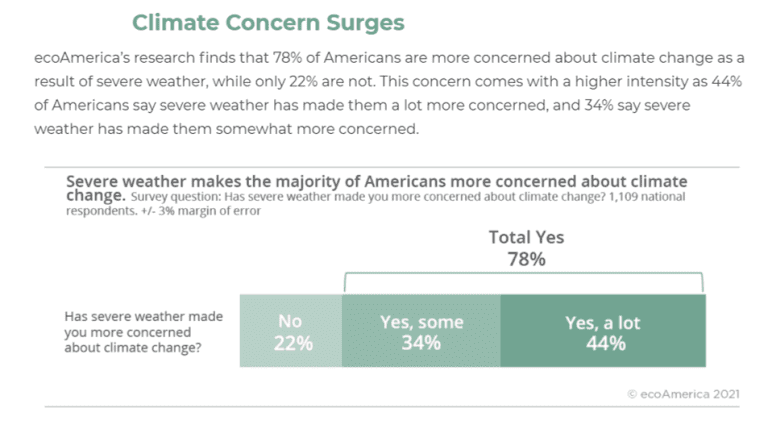
We can surmise, then, that if the majority of the American public is convinced that climate change is real, is human-caused, and requires action, preachers are getting less resistance when they preach about it compared to previous years.
So clergy may be reading the room, noting that their congregations are more concerned about climate change than in years past.
For example, EcoAmerica’s 2021 research shows that “a vast majority of Americans (96%) believe we have a right to live in a healthy environment with clean air and water. These findings remain in consensus across the major demographic groups studied — including 96% of rural Americans who say they agree with this statement as do 97% of urban Americans.”
While correlation shouldn’t be confused with causation, my hunch is that clergy appear to be feeling the both increased urgency and freedom to address environmental issues in their sermons due to this shift in public opinion.
Further, our research indicates that when preachers frame these issues using biblical and theological language, they are less likely to receive negative reactions.
For example, my team and I tested the contentiousness of certain words with congregations to see how “political” they were. We surveyed congregants in ten Disciples of Christ congregations in the mid-central U.S. in 2019 and 2020 and gave them a list of terms such as guns, capitalism, and Black Lives Matter. Interestingly, the term God’s Creation was the least triggering term on the list. In contrast, the term climate change was in the top ten most volatile terms in both years. So preachers may find that using a “cooler” terms in their sermons about environmental issues is a viable strategy for addressing these topics with their congregation.
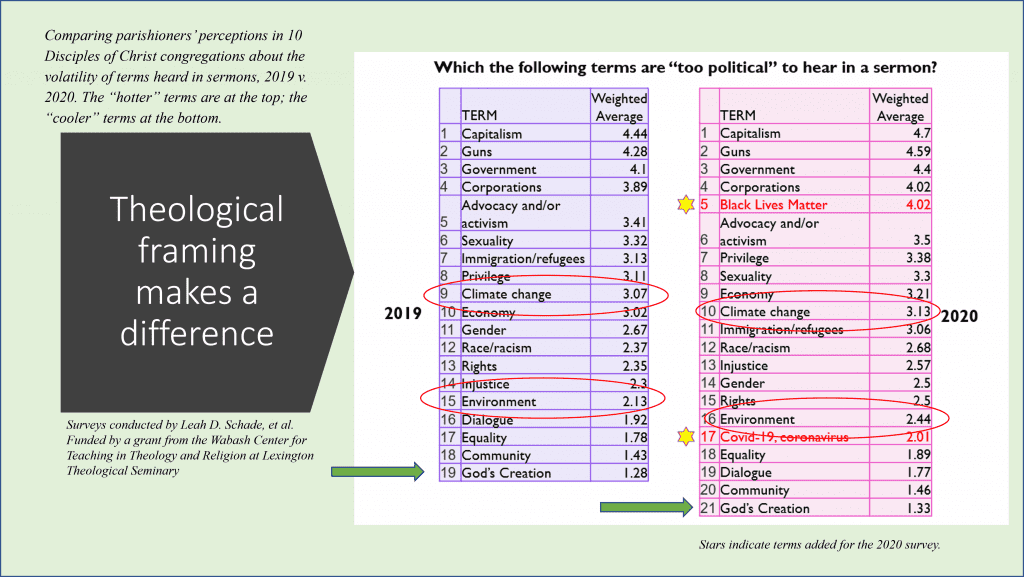
Yet, Fletcher Harper, executive director of GreenFaith, recently wrote an article in Sojourners calling for preachers to stop soft-peddling their preaching about the climate crisis.
He urged clergy not to preach about “being good stewards of the earth,” but to bring the “prophetic thunder.” “The world needs religious voices that clearly name the causes of this dire crisis, articulate a moral vision, and catalyze courageous action to meet the suffering that lies ahead while bending history’s arc towards justice.” Harper admonished faith leaders to get comfortable saying things like:
“ExxonMobil, BP, Shell, and other oil and gas companies are systematically destroying the planet — and financial giants like JPMorgan Chase, Bank of America, Wells Fargo, BlackRock, and Vanguard are bankrolling the destruction.” . . . When describing the actions of these leaders and institutions, we must use some of the strongest language in our moral vocabulary, words like “shameful,” “deadly,” and “morally abhorrent.” We must make it clear that these companies, their shareholders, our government, and those working for these institutions must change.
But will this kind of strong prophetic language work in every context?
We might wonder how an explicit sermon such as Harper envisions would be received by congregations whose members are employed by companies that profit from “bankrolling the destruction,” or who have more general anxieties over economic fallout from addressing climate change.
For instance, in the 2017 clergy survey, several noted how difficult it is to preach about environmental issues when the livelihood of their parishioners is tied to the fossil fuel industry. As one respondent said, their congregation views clean energy as “a direct economic threat in an already severely depressed area.” Another respondent put it like this:
The economy of my city is heavily dependent on fracking, and although it is a deeply eco-aware congregation, it is also a congregation that realized that the slowing or elimination of fracking in our community has incredibly far-reaching negative impacts on families in our community.
How do clergy navigate the tug-and-pull between their prophetic and pastoral roles with environmental issues?
Homileticians such as Cleophus LaRue, Dale Andrews, Leonora Tubbs Tisdale, and Kenyatta Gilbert have argued that, in fact, the pastoral and prophetic aspects of ministry are not separate, but integrated. Applied to fracking, for example, when a drilling operation poisons the water, increases air pollution, and leads to higher cancer rates in the community, the pastoral care required is directly related to the need for a prophetic voice to address the cause of these problems in the first place. Therefore, we can think about ways clergy and congregations could view each other as partners in addressing environmental issues with what Andrews calls “prophetic care.”
What are ways to help congregations and preachers see each other as collaborators in addressing environmental issues?
In his book, Surviving a Dangerous Sermon, Frank Thomas encourages preachers to ask, “If I am going to preach a dangerous sermon, how do I construct arguments that build a bridge so that another worldview and I can communicate?” (43). I argue that sermons about environmental issues (and all social issues, for that matter) need to be preached as part of a collaborative effort with their congregations in order to dialogue and discern how God is calling them to respond in the midst of these complex issues.
In my book, Preaching in the Purple Zone: Ministry in the Red-Blue Divide, I suggest using a process I developed called the sermon-dialogue-sermon method.
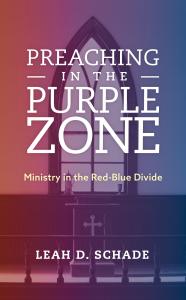
In chapter 10, you can read about one preacher, TJ Lynch, who followed the sermon-dialogue-sermon process for addressing climate change. He used the National Issues Forum Institute issue guide “Climate Choices” in his congregation. His first sermon was a non-partisan invitation to engage the issue through respectful listening and dialogue. Then he moderated a deliberative dialogue in which congregants shared their personal stake in the climate crisis and weighed benefits and drawbacks to three different approaches to the issue. After that, they identified shared values so that they could determine next steps for responding as a congregation. His follow-up sermon integrated insights and wisdom from the dialogue, framing it theologically and biblically, offering a shared vision of putting faith into action based on the congregation’s discernment. (See pp. 167-173 in Preaching in the Purple Zone.)
In whatever ways preachers choose to address environmental issues, the research indicates that congregations are, in fact, ready and perhaps even eager to hear a sermon that brings moral imagination to the climate crisis. With the collective fate of the planet in peril, preaching about climate change and other environmental issues is vital. God’s Creation needs good preaching! Good preaching needs God’s Creation!
Check out these websites that provide resources for worship and preaching from an environmental perspective.
- EcoPreacher 1-2-3: https://www.interfaithsustain.com/ecopreacher-123/
- Sustainable Preaching: http://sustainable-preaching.org/
- Greening the Lectionary: https://www.greeningthelectionary.net/
- Season of Creation: https://seasonofcreation.org/
- Lutherans Restoring Creation worship and preaching resources: https://lutheransrestoringcreation.org/worship/
- Blessed Tomorrow: https://blessedtomorrow.org/
Read also:
A Dozen Bible Passages for Preaching a Creation-Care Sermon
Church Leaders Need Climate Ambition: Grassroots and Treetops
We’ve Lost the Climate War. It’s Time to Surrender.
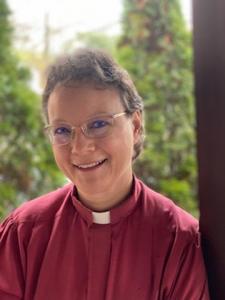
The Rev. Dr. Leah D. Schade is the Assistant Professor of Preaching and Worship at Lexington Theological Seminary in Kentucky and ordained in the ELCA. Dr. Schade does not speak for LTS or the ELCA; her opinions are her own. She is the author of Preaching in the Purple Zone: Ministry in the Red-Blue Divide (Rowman & Littlefield, 2019) and Creation-Crisis Preaching: Ecology, Theology, and the Pulpit (Chalice Press, 2015). She is the co-editor of Rooted and Rising: Voices of Courage in a Time of Climate Crisis (Rowman & Littlefield, 2019). Her latest book, co-written with Jerry Sumney is Apocalypse When?: A Guide to Interpreting and Preaching Apocalyptic Texts (Wipf & Stock, 2020).
Twitter: @LeahSchade
Facebook: https://www.facebook.com/LeahDSchade/
Methodology for the Ministry, Preaching, and Social Issues Study
The data for this project comes from two online surveys distributed to preachers via social media (Facebook, Twitter), newsletters of large organizations serving clergy (state councils of churches, Alban Institute, Backstory Preaching, Clergy Emergency League, etc.), emails to listservs through seminaries and denominational offices, and emails sent directly to individuals. The surveys included both fixed-choice and written comments allowing for both quantitative and qualitative data. The first survey was conducted in January and February of 2017, and the second in January and February of 2020.
Responses were anonymous, including demographic variables for further analysis by age, gender, sexual orientation, and race/ethnicity. We also tested for clergy characteristics such as denomination, role in the congregation, and political orientation. As for congregation characteristics, the clergy reported on their church’s on setting (rural, suburban, urban), worship attendance, racial/ethnic diversity, and political diversity. This allowed us to test for variables when asking about topics preachers chose to address (or avoid), frequency of addressing social issues, rationale for addressing (or staying away from) social issues, the types of pushback and affirmation they receive from congregations, and barriers as well as supports they experience when preaching these kinds of sermons.
A huge thanks to my research team: Dr. Katie Day, United Lutheran Seminary; Dr. Wayne Thompson, Carthage College; and Dr. Amanda Wilson Harper, Tarleton University.
Funding for the research with the Disciples of Christ congregations was provided through a grant from the Wabash Center for Teaching and Learning in Theology and Religion and was conducted at Lexington Theological Seminary.













